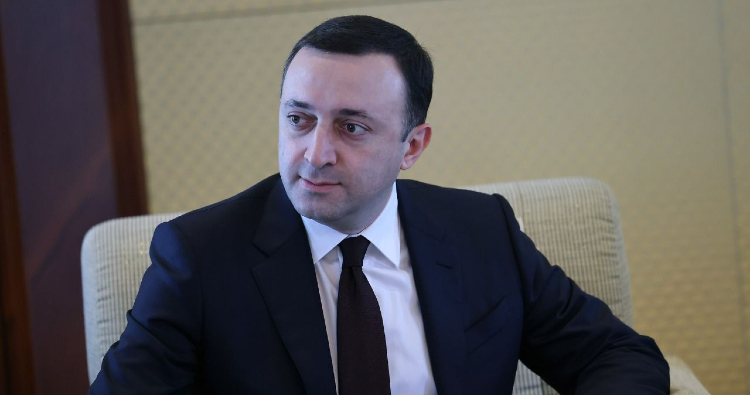PM highlights green energy projects, tourism cooperation, economic questions at Georgia-China Business Forum

The PM told the Forum his country represented a “crucial link” in the Middle Corridor logistics route between Central Asia and Europe, and the Belt and Road Initiative, and reached out to Chinese business companies to discover investment opportunities in Georgia and take advantage of the benefits of relocating production to the country and expanding of their operations. Photo: Government press office
Georgia’s Prime Minister Irakli Garibashvili on Monday highlighted green energy projects, economic issues and strengthening bilateral tourism potential at the Georgia-China Business Forum in Beijing.
The PM said he hoped his visit would be an impetus for closer cooperation and deepening the “long-standing friendship” between the two countries, and told the Forum development of airline ties with China would be “crucial” in strengthening tourism relations, increasing visitor numbers and fostering better ties between interested parties and businesses in the sector.
He also noted the restoration of direct flights between Georgia’s capital Tbilisi and Ürümqi, the capital of China’s Xinjiang Uyghur Autonomous Region, following the Covid pandemic earlier this year had shown a “great potential” given the strategic importance of commercial and tourist links with China.
He also told the event one of his Government's “top priorities” was to improve the country's transit role by connecting Georgia to its Eurasian neighbours with both new and existing high-capacity fibre optic lines and promote Europe and Asia's digital connectivity through Georgia.
The PM said his Government was considering developing a regional digital hub which, on the one hand, would have a global connection to the fibre optic Internet infrastructure linking Europe and Asia via the quickest path and, on the other, operate local data centres. He noted research was being done into consulting services for the development of digital hubs, corridors, and investor attraction concepts.
Garibashvili also highlighted Georgia’s rich renewable energy resources, such as hydropower with about 40 billion kWh potential, of which only 30 percent was being utilised, noting a new renewable energy assistance programme - using auctions to distribute renewable energy capacity based on market and competition principles - was created and authorised last year in an effort to draw in investors.
The Black Sea submarine cable project, which involves construction of a high-voltage underwater transmission infrastructure to connect the South Caucasus grid to those of European Union member states and allow export of green energy to Europe was also mentioned by the official. The initiative also includes Azerbaijan, Hungary and Romania, with the Government head noting it held “significant promise” for Georgia's future energy landscape as it corresponded with the country's dedication to developing renewable resources.
Garibashvili also highlighted the mentioned projects and Georgia's long-term development plans would “closely align” with the goals of China’s Belt and Road Initiative in aiming to improve the physical infrastructure through land corridors that roughly equate to the old Silk Road, pointing out Georgia was the first country to ratify the charter of the Asian Infrastructure Investment Bank. He also expressed his “sincere joy” at the signing of the bilateral cooperation plan between the governments of China and Georgia within the BRI earlier during the day.
The PM told the Forum his country represented a “crucial link” in the Middle Corridor logistics route between Central Asia and Europe, and the Belt and Road Initiative, and reached out to Chinese business companies to discover investment opportunities in Georgia and take advantage of the benefits of relocating production to the country and expanding of their operations.
He also mentioned the Tbilisi Silk Road Forum would run between October 26-27 and host up to 2,000 delegates, government officials and business representatives from more than 60 countries in its first edition since the Covid-19 pandemic to review “factors defining regional and global trade and connectivity”, and extended his invitation to Chinese business circles.
He also noted Georgia’s “great” business climate, low operating costs, access to renewable energy sources and free trade access to markets with a population of over two billion people, telling participants of the Forum the country was a “true trade hub” between Europe and Asia and had the fastest-growing economy in the Black Sea region.
“I would like to mention Georgian wine separately. As you know, Georgia is the cradle of wine. The continuous winemaking tradition of my country dates back 8,000 years. Georgia is the only country in the world where methods developed since ancient times have not been abandoned and are still used in winemaking. As proof of its cultural importance and in accordance with the principles of UNESCO, the ancient Georgian tradition of making wine in a clay vessel - qvevri - has been granted the status of a national monument of intangible cultural heritage”, he pointed out.
The PM also told the Forum market potential, economic benefits and prospects for bilateral cooperation made China a “strategically important place” for Georgian wine exports, noting the increased involvement of Georgian winemakers in international exhibitions showed the country was committed to the idea of expanding its presence in the Chinese market and, at the same time, emphasising the growing interest in Georgian wine.
He added the Georgian Government was “committed” to provide assistance to businesses interested in investing in the country, founding the Enterprise Georgia agency for the purpose in 2014. Garibashvili told the event the body served as a link between international investors and the Georgian Government, providing access to the most recent information and facilitating “efficient communication” with Government officials.
The PM told the Forum he hoped the China visit would pave the way for a "deeper cooperation, strengthening the long-standing friendship, and creating a brighter tomorrow for our nation".
 Tweet
Tweet  Share
Share